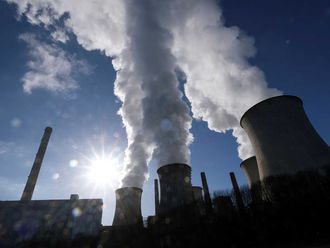Inner Mongolia Baotou Steel Rare-Earth Hi-Tech Corp can hardly be described as the rock star of the Shanghai Stock Exchange, yet, this first half, it flaunted a net profit leap of nearly 627 per cent compared to the period last year.
Baotou, after all, is the world's biggest rare earth producer, those rare and obscure elements vital for manufacturing anything "green" and new-age, from solar panels, hybrid car batteries, iPods, wind turbines to missile-guidance systems, aircraft electronics and satellites.
If green stocks are the ethical and profitable flavours for all seasons to come, "rare earth" companies are the dark horses and China is the giant crucible that churns market momentum, pricing and trade bitterness.
Unlike steel, copper and iron ore, which China dictates, but doesn't always control, rare earth is a commodity that should have been completely under its manipulation. As Deng Xiaoping once famously said: "If the Middle East has its oil, China has its rare earths".
The country supplies more than 95 per cent of the global output of rare earth oxides and sits on nearly 60 per cent of the world reserves according to US geological data. Strangely, for a nation that rules by splinter-level control, these precious elements were left vulnerable to over-exploitation, poor management, illegal mining and were heavily undervalued in the world markets.
While demand tripled to 120,000 tons in the past decade, the price of the minerals rose only a little more than 20 per cent since 1979, averaging $8,500 per tonne in 2009.
However, the days of China supplying this raw material for the industrial green revolution at throwaway prices, are coming to an end. Since 2006, industry officials realised that even after continued growth in exports, the industry just didn't receive its due profit returns.
The government has thus launched an aggressive industry consolidation and pricing and quota measures, generating uproar in the West.
Last month, China drastically cut export quotas for rare earth for the second half of 2010. The total Chinese export quota for 2010 is 30,258 tons, 40 per cent less than the 50,145 tons for 2009. To streamline the sector further, the government also ordered that production of rare earths would be capped at 89,200 tons in 2010, up only 8.36 per cent from 2009.
Illegal mining
Also, major industry consolidation is under way to stop illegal mining. Strategic rare earth minerals will only be mined by state-owned-enterprises and private companies can collaborate with the selected firms through shareholding.
For the present, Baotou Rare-Earth is likely to monopolise reserves of light rare earth elements in the northern and western autonomous regions, while its more well-known counterparts China Minmetals Company and Aluminum Corporation of China will control the major reserves of middle and heavy rare earths in the south.
Strangely, China's effort to streamline the sector has caused international uproar. After the recent conflict between China and the West over Yuan appreciation, rare earth is turning out to be the next most contentious issue. Beijing's move to reduce exports has American lobbyists baring their claws at the World Trade Organisation, accusing China of hoarding material.
The US which holds 15 per cent of the reserves, had long stopped production and depends entirely on China for the supply of cheap raw material. This, according to the Chinese ultranationalist press, is a bid by the Americans to hoard their own resources and force China to deplete theirs.
The West, on the other hand, sees a more diabolical plot. The US administration noted last year that Beijing officials were forcing global manufacturers to move factories to China by limiting the availability of rare earths.
Whatever be the political dynamics, China putting the lid on exports has worked well for other foreign companies. Australian firms such as Lynas are gearing up to meet the supply deficit. Its shares rose in the Australian Stock Market in recent weeks.
Other multinational companies such as South Korean steelmaker Posco are taking the mergers and acquisitions route to beat the Chinese at their game. Posco-China and Korea Resources Corporation acquired a controlling stake in a Chinese rare earth mining company, Yongxin Rare Earth Metals, to bypass export curbs.
The writer is a freelance journalist based in China











